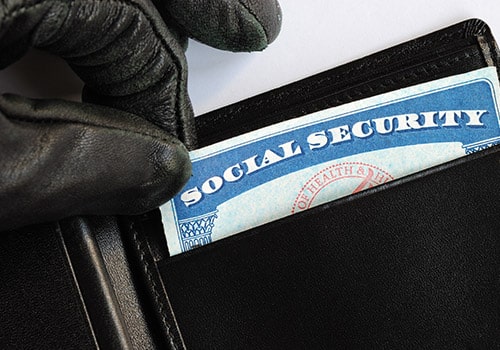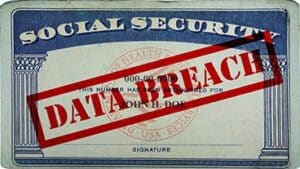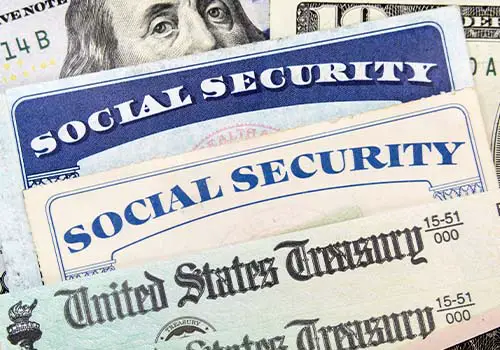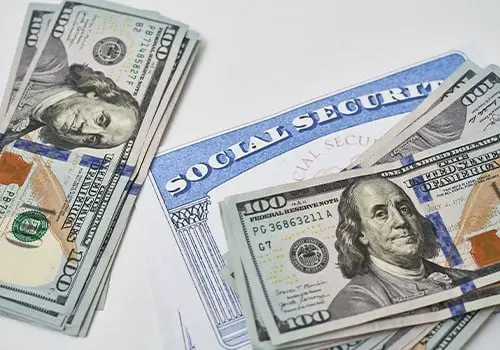Your Social Security number is one of the most critical pieces of identifying information that you have. Unfortunately, it can also be vulnerable to thieves and hackers. If your SSN falls into the wrong hands, it can have dire consequences. Notably, it can wreak havoc on your finances.
Suppose an identity thief gets access to your Social Security number. In that case, they can open new credit card accounts, take out loans, access your bank account, use your health insurance, and perform many other nefarious tasks. This is why it is imperative to both safeguard your SSN and be able to tell whether someone has used it.
So, how do you check to see if someone is using your Social Security number? Keep reading as we give you the signs to watch for, as well as tell you what to do if someone does gain access to your SSN.
How To Check To See If Someone Has Been Using Your Social Security Number
Do you want to know, ”How do I check if someone is using my identity?” There are a few ways to check if someone has used your Social Security number.
Reporting Bureaus
One of the most thorough methods is to check your credit report. Three major credit reporting bureaus are Transunion, Equifax, and Experian. Each agency maintains a credit report associated with your Social Security number. Your credit report contains information such as listing all credit accounts opened in your name, your payment history, current and previous addresses, and more. Lenders typically use the information in your credit report to determine whether or not to make you a loan.
Check Credit Report
Regularly checking your credit report is a great way to see if someone has access to your SSN. If you notice accounts on your report that you did not open, that is a surefire sign that someone has been using your Social Security number. You can visit annualcreditreport.com to obtain a free copy of your credit report from each major credit bureau annually. If you have been the victim of identity theft, you are entitled to more frequent access to a free credit report.
Review Social Security Statement
In addition to checking your credit report with the credit reporting agencies, you should also keep an eye on your Social Security statement from the Social Security Administration (SSA). This statement gives you access to your earnings history and withdrawals from Social Security. If you notice suspicious activity on your Social Security statement, there is a good chance someone is using your SSN.
Monitor Bank Records
Finally, keep a regular check on your financial statements and bank records. Check your credit card statements each month to ensure there is no suspicious activity. If you notice withdrawals or debits from your bank account that you did not authorize or new accounts that you did not open, there is a problem. Someone may be using your Social Security number to perform unauthorized transactions on your accounts.
KEY TAKEAWAYS
- You can check if your SSN has been stolen by reviewing your credit report and Social Security statement and monitoring your bank records.
- Be on the lookout for changes on your credit report, password reset emails, and fake tax returns. This usually means your identity has been stolen.
- Victims of SSN identity theft need to report it immediately, put a fraud alert on their SSN, and register for credit monitoring.
6 Signs Your Social Security Number Has Been Stolen
In addition to keeping a regular check on things, as mentioned in the previous section, there are a few telltale signs you can watch for that might signal a stolen Social Security number. If you notice any of these signs, you should immediately take action to prevent further damage to your credit file. Here are the signs you should be aware of.
#1. Significant Changes On Your Credit Report
Significant changes on your credit report are almost always a sign of a stolen Social Security number. If you notice sudden and substantial changes in your report, you must get to the bottom of the issue immediately. These changes could come in different forms. The changes could be a lower credit score, late payments on your file, or new accounts on your report.
If you notice any of these changes and don’t know how they got there, your Social Security number is almost guaranteed to be stolen. Thieves have used your personal information for financial gain and have attempted to leave you holding the bag.
#2. “Password Reset” Emails In Your Inbox
If you have suddenly started receiving “password reset” emails in your inbox, someone might be attempting to use your Social Security number. These emails are typically sent when someone tries to access your online accounts, such as your bank or credit card accounts. A thief might be attempting to reset your password, and they could have access to your Social Security number to do so.
You should take action if you receive any password reset emails in your inbox that you did not initiate. Go ahead and change your password on that account to help prevent unauthorized access. You might also want to contact the company and inform them of the unauthorized access attempts. They can put a note on your account that requires additional identity verification before allowing access.
#3. Unknown Withdrawals On Your Social Security Statement
You should know whether or not you are receiving Social Security benefit payments. Regularly checking your Social Security statement is critical to ensuring no one else is accessing your benefits. To get Social Security benefits, you must have your Social Security number. So, if you see unknown withdrawals on your statement, that is a clear sign that someone else has access to your Social Security number.
You should contact the Social Security Administration right away to report the fraud. They can advise you on the next steps to correct the situation. The thief might even attempt to sign up for Medicare using your SSN.
#4. Fraudulent Tax Returns
Identity thieves can not only open new accounts with your Social Security number, but they can also get you in trouble with the Internal Revenue Service. Someone with access to your SSN can file fraudulent tax returns with the IRS. They might be able to report false information and have fraudulent tax refunds routed to their bank accounts. And they would do all this using your Social Security number.
You can visit IRS.gov to learn more about ordering transcripts of your prior tax returns. If you notice additional returns on your transcript that you did not file, you are likely the victim of ID theft.
#5. Inaccurate Banking Records
You should always check your bank statements thoroughly each month for inaccuracies. Someone might be using your Social Security number if you notice suspicious withdrawals or other suspicious activity.
With access to your SSN, a thief might be able to call your bank and gain access to your account. They might be able to transfer money from your account into their account if they can impersonate you using your SSN successfully. If you notice any unauthorized transactions on your bank or credit card statements, you should immediately contact your financial institution.
#6. Letters In The Mail From The IRS Or The Bank
The bank will often send you a letter to confirm certain transactions on your account. Similarly, the IRS might send you letters about your tax returns or other activities. If you begin to receive letters from the IRS or your bank, you should take them seriously.
If you are unaware of the activity mentioned in the letter, someone has likely used your Social Security number fraudulently. You should read the letter thoroughly, as most letters will include instructions for what to do if you did not initiate the activity. Follow the instructions in the letter or contact the IRS or your bank if no instructions are included.
Must read articles related to Social Security Numbers
- Find your Social Security Number Prefix by state.
- Can your Social Security number be suspended?
- Fourteen ways to protect your Social Security number.
- What is a Social Security Award Letter…how do you get a copy?
- Why is your Social Security number important?
What To Do If You Are The Victim Of SSN Identity Theft
Suppose you noticed one of the above red flags and confirmed that someone had fraudulently used your Social Security number. Now that you realize you have been the victim of Social Security identity theft, what do you do next? If your identity has been stolen, here are the steps you must take.
#1. Report The Theft Right Away
You should first report the theft as soon as possible. You will need to report the theft to a couple of different agencies. Go ahead and contact your local police department to report the theft. More than likely, you’ll need a police report from your local police department to start the process of getting the fraud removed from your credit report.
You should also report the crime to the Federal Trade Commission (FTC). To repair your credit, you might also need a copy of your FTC report when you start the clean-up process. Learn more about the reporting process and the steps you should take by visiting identitytheft.gov.
#2. Put A Fraud Alert On Your SSN
After you report the theft, you will want to take steps to prevent your Social Security number from being used again. You should go ahead and place a fraud alert on your SSN immediately. This will notify the credit agencies that you have been the victim of ID theft, forcing them to take additional steps to verify your identity before allowing anyone access to your credit report. The fraud alert is typically good for one year, although the credit agencies might extend it for up to seven years once the fraud has been confirmed.
In addition to a fraud alert, you might consider placing a credit freeze on your Social Security number. Instead of requiring additional identity verification steps, a credit freeze blocks complete access to your credit history and reports. This makes it almost impossible for anyone to open new accounts using your information.
#3. Register For Credit Monitoring
Signing up for a credit monitoring service can be a great way to help prevent future fraud on your SSN. These protection services can provide immediate notifications if someone attempts to use your Social Security number. Some of these services also offer insurance protection, and they will assist in getting fraudulent items removed from your credit report.
Registering for credit monitoring can be a great idea even if you have not been the victim of ID theft – mainly if you know your information was part of a data breach. These services can help keep an extra set of eyes on your personal information and can help you catch any suspicious activity as quickly as possible.
#4. Request A Replacement Social Security Card
Requesting a replacement Social Security card is usually a last resort. The Social Security Administration does not typically issue new Social Security numbers to ID theft victims but will issue a new number and card in certain situations.
You must prove that the ID theft is so bad that you can never recover your credit history without a new Social Security number. The Social Security Administration will issue you a new Social Security number and card if you can provide proof. This will allow you to start your credit history with a new number, and you should take every precaution possible to help protect your new number from being compromised.
Remember that the SSA will not issue a new SSN if yours has been lost, but you can get a replacement for a lost or stolen Social Security card with the same number.
TIP
Victims of identity theft should notify the police and file a report with the FTC. Notifying authorities of the crime can help them catch the perpetrators and prevent others from being scammed.
How Do I Protect My Social Security Number From Theft?
Limit Sharing Your SSN
You can do several things to help protect your SSN from theft. First and foremost, you should never share your Social Security number with anyone unless necessary. If you attempt to get a loan or open a new account with a credit card company, they will need your SSN to check your credit report. Even when sharing your SSN in such situations, always type your number directly into their system if possible. Try to avoid writing it down where it might be stolen by someone else.
Watch out for Scammers
Always be on the lookout for scams and scammers. Watch for phishing scams in your inbox or phone calls from someone attempting to impersonate your financial institution. Most companies never call you directly and ask for your account or Social Security number. If they do, you should NOT share it with them. Call the company back at a known phone number and inform them of the call. More than likely, it was not them who was calling.
Secure your Social Security Card
Do not carry your Social Security card with you except when necessary. If you need to show your Social Security card for employment verification or another reason, bring it. Otherwise, your card should remain in a safe place at home. This can help prevent possible theft through the loss of your Social Security card. Your driver’s license will almost always suffice for identification purposes, so there are only a few reasons why you would need to show your Social Security card to anyone.
The Bottom Line
If your Social Security number falls into the wrong hands, it can result in severe consequences for your financial information. It could even get you in trouble with the IRS if a thief attempts to impersonate other taxpayers.
Checking to see whether someone has been using your SSN is not that difficult. You should also regularly view your credit report and keep an eye on your Social Security statements, which are readily available through your My Social Security account.
If you notice suspicious activity, you should immediately report it to the local authorities and the FTC. In addition, you should place a fraud alert on your SSN and consider signing up for credit monitoring services.
Frequently Asked Questions
Yes, someone can use your SSN without you knowing. One thing that makes ID theft so dangerous is that you might not even know it has happened for months or years.
You might attempt to get a car loan or mortgage and discover that a thief has ruined your credit file. Credit monitoring services help alert you that someone is trying to use your Social Security number. Keeping a regular check on your credit report is also extremely important because it allows you to identify suspicious activity in a timely fashion.
You can put a fraud alert on your Social Security number by contacting one of the three credit reporting agencies. The fraud alert can typically be done entirely online. Once you have placed an alert with one agency, they must notify the other two agencies. There is no need to contact all three agencies.
A fraud alert remains on your file for one year, although you can choose to renew the alert at the end of the year. If fraud has been confirmed on your Social Security number, the agencies themselves might decide to extend the fraud alert automatically.
Yes and no. You cannot freeze your Social Security number with the Social Security Administration and stop it from being used. However, you can place a credit freeze on your Social Security number with the credit reporting agencies.
While this cannot wholly prevent your SSN from being used, it blocks access to your credit report. Since most lenders require a copy of your credit report before issuing new credit, the freeze effectively blocks anyone from opening new accounts using your information.
Yes, it is possible that someone could access your bank account with your Social Security number. Most thieves will attempt to access your account over the phone since most banks require a valid photo ID for in-person account access.
However, suppose your bank uses your Social Security number as verification data for phone transactions. In that case, a thief with access to your SSN might be able to perform transactions on your bank account. If you suspect someone has stolen your SSN, you should notify your bank to take additional identity verification steps before allowing anyone access to your account.
You can find a Social Security Administration office near you by using our SSA office locator and searching for your closest location.







